Vietnam is home to some 2,030 miles of beautiful coastline and hundreds of islands.
But one in particular is well on its way to contending with beach giants such as Phuket or Bali.
Phu Quoc, a 222-square-mile island in the Gulf of Thailand, has welcomed rapid development and an ever-increasing list of direct flight connections.
Visitor numbers have grown in parallel, catapulting to an estimated 2.5 million in 2018 – a 25% jump compared with the year prior.
Most come for the beautiful beaches – such as Sao Beach, Long Beach and Ong Lang Beach – but there’s much more on this travel menu.
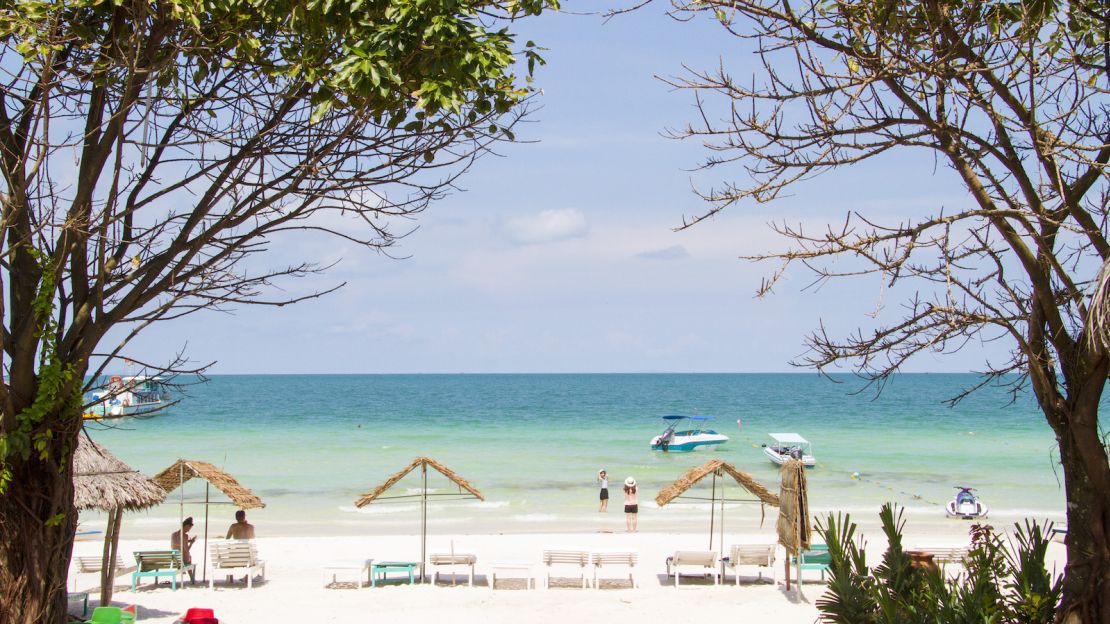
Travelers can kayak through fishing villages or dine on fresh seafood aboard a floating platoon, go squid fishing or visit a pearl farm to see how “Pearl Island” got its nickname.
“I grew up on the island and it’s changed a lot in the past 10 years but has retained its natural beauty,” Anna Nguyen, a local expert who works with travel experience platform Klook, tells CNN Travel.
“Many people come for a weekend getaway, since it’s a quick flight from Ho Chi Minh City, but there’s so much to do; you can live here your whole life like me and still be exploring.”
For some inspiration, here are a few things to do in Phu Quoc to add to your itinerary.
Dive right in
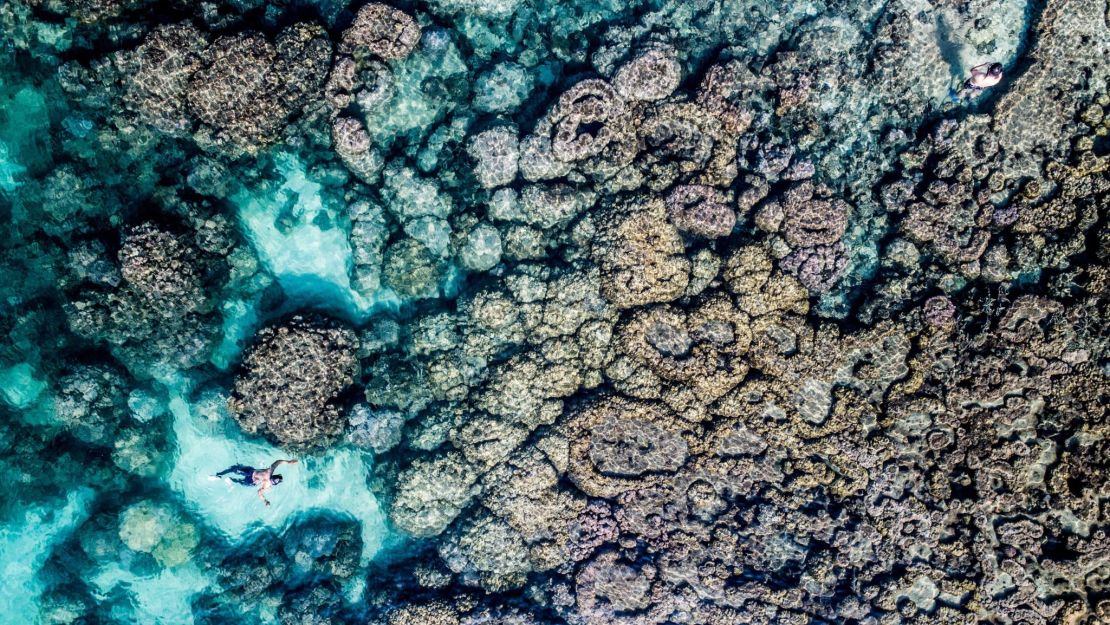
Whether you’re keen to snorkel or scuba dive, the waters around Phu Quoc are teeming with marine life, most of which is centered around the Phu Quoc Marine Park in the south or the Ganh Dau Coral Gardens just off the northwestern tip.
In addition to crabs, squid and hundreds of coral reef fish, you might also be lucky enough to spot a hawksbill turtle or a green turtle – both of which are endangered.
If you have your heart set on diving, the best time to go is during the dry season, from October to April, for the best visibility.
Dine at Ham Ninh fishing village
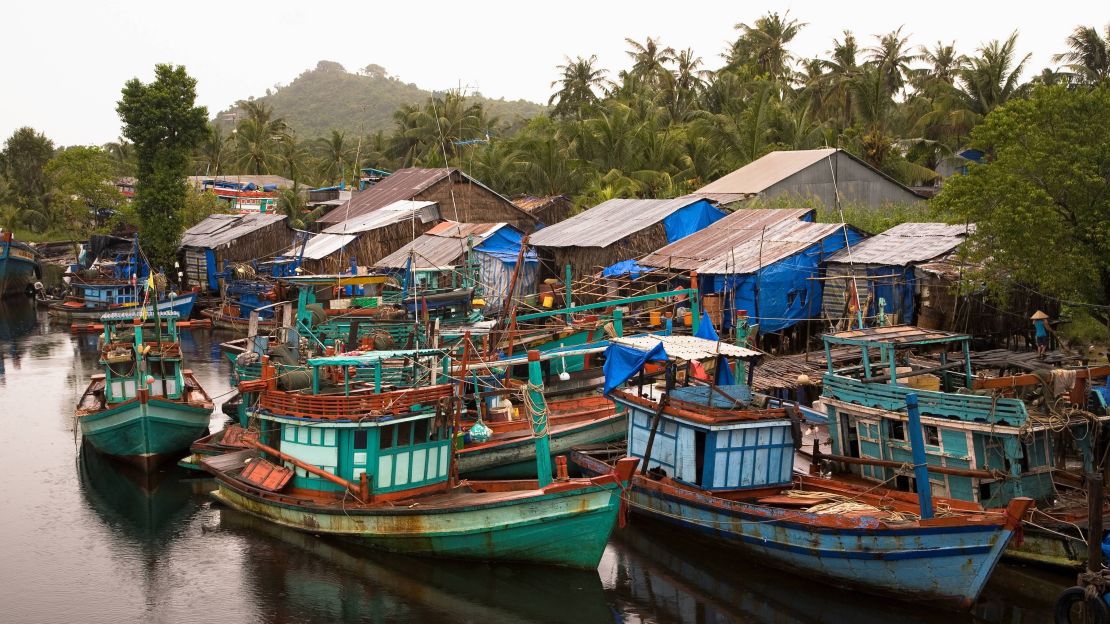
A combination of an outdoor restaurant and seafood market, Ham Ninh fishing village promises an affordable, convivial night out.
Located on the eastern coast, the village is set inland from the ocean along a canal where stilt houses, colorful boats and floating restaurants hover above the water.
“You can find so many types of seafood here, such as the famous crabs, clams, oysters and sea urchin – that’s really special,” says Nguyen. “But if you like fish, you should try cobia fish [also known as black kingfish] – it’s a tender, flaky white fish with black scales.”
For lunch or dinner, travelers can simply pick from the daily catch and choose a preparation method – grilled, steamed, hot pot style or fried up with local pepper, garlic and a mountain of Vietnamese herbs.
Go kayaking
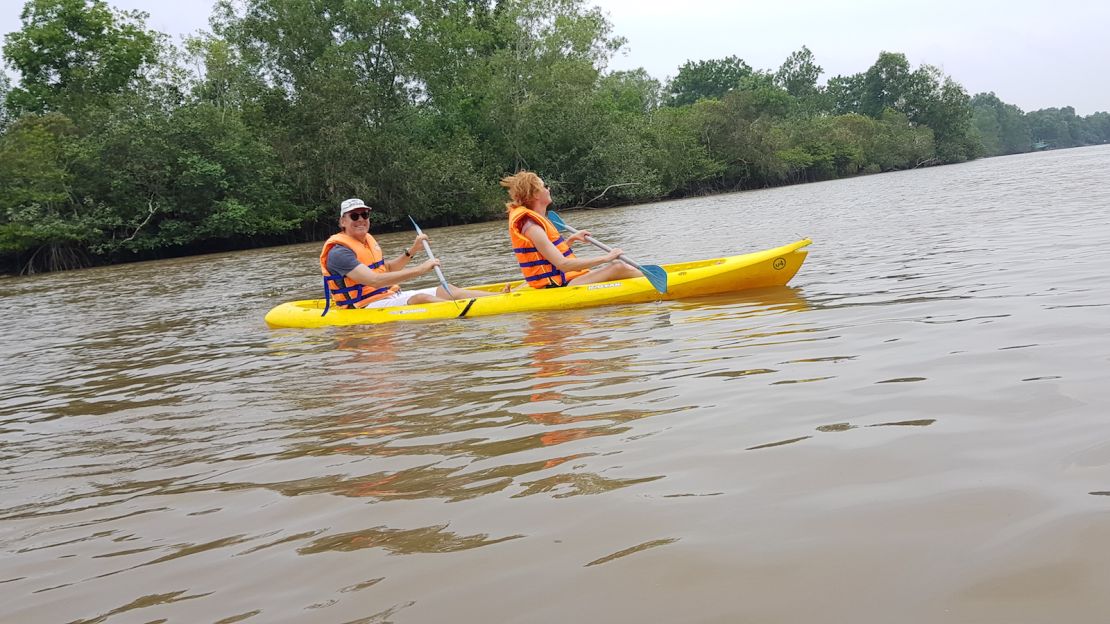
On the northern end of Phu Quoc, Cua Can river winds from the sea into the center of the island.
The 14-kilometer stretch of water is an ideal place to go kayaking, especially for beginners, thanks to the calm currents and jungle surrounds.
“It’s very quiet and peaceful – it feels like a hidden gem because you can’t get there by car,” says Nguyen. “You really have to know where you’re going.”
At the end of the river, where the water feeds into the Gulf of Thailand and white sandbanks glisten under the sun, a small fishing village of wooden bridges and stilt houses offers a chance to stop for an atmospheric lunch.
If you’re confident in the kayak, travelers can paddle out into the ocean and explore nearby coral reefs and isles.
Take a trek
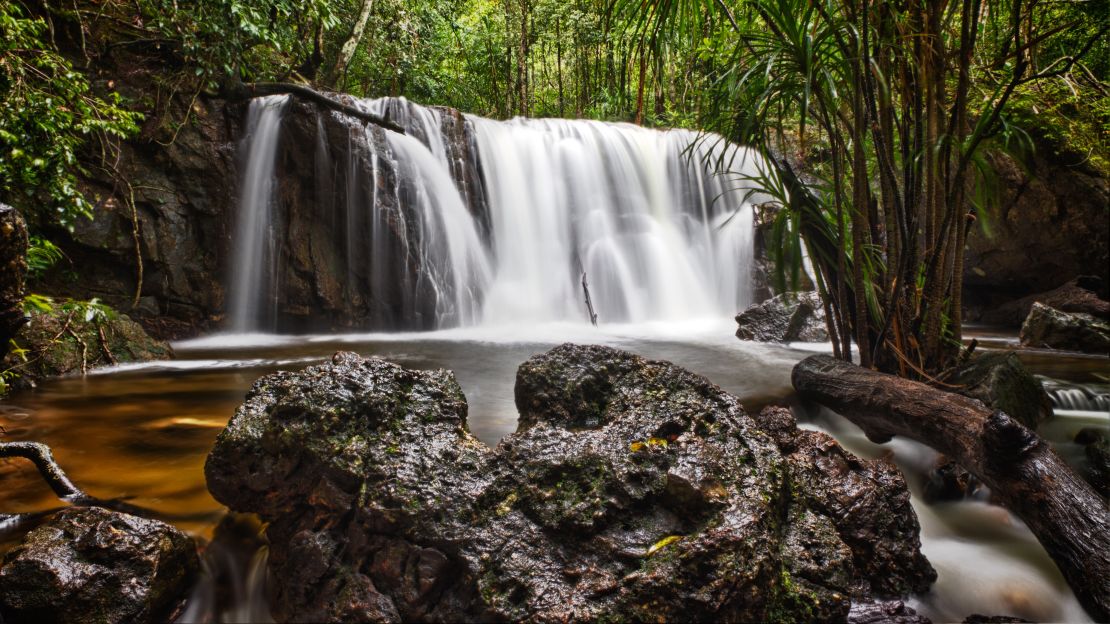
Part of the larger UNESCO-recognized Kien Giang Biosphere Reserve, the island has no shortage of flora and fauna.
In fact, roughly 70% of the island is covered by untouched forests and mountains.
The namesake Phu Quoc National Park is home to easy walking trails, as well as trees that look like they sprouted in the Jurassic era and more than 200 wild animal species and rare birds, such as the great hornbill.
“The trees are huge and impressive, some are hundreds of years old,” says Nguyen. “It reminds you of what you’d see at Angkor Wat.”
For more trekking, Nguyen recommends heading into the mountains, though be warned that trails often lack established pathways and signage.
One of the best treks begins right after Suoi Tranh Waterfall in the south-central part of the island.
First, you’ll walk for about 30 minutes through a peaceful forest to reach the falls. From there, a small trail leads up the mountain for about two hours.
At the top, a lookout point gives travelers panoramic views of the green canopies below and ocean in the distance.
Visit a farm
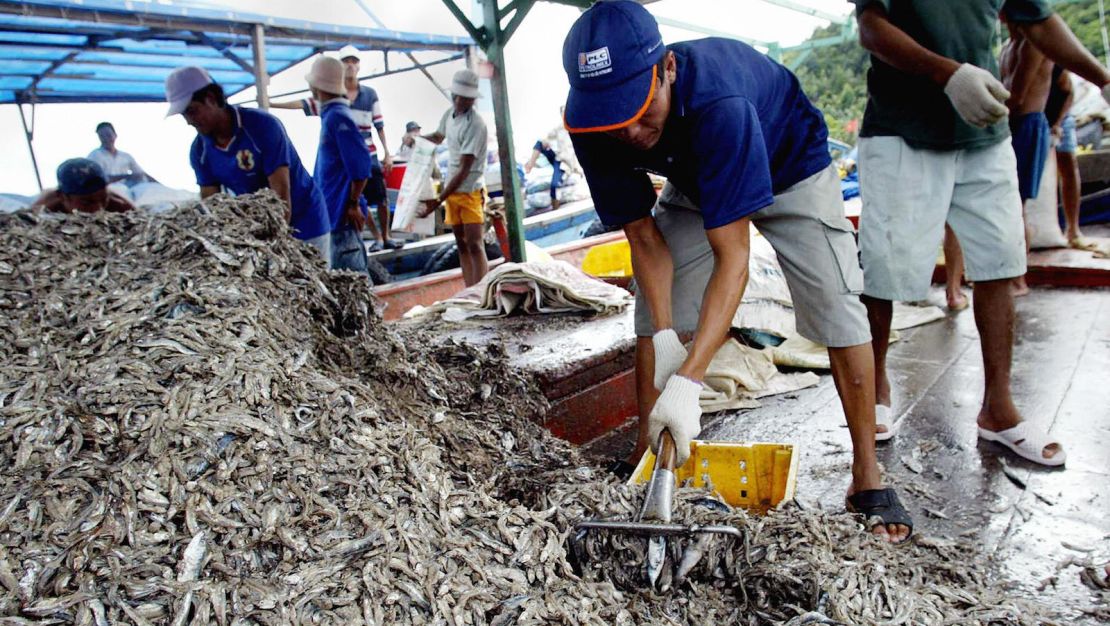
Though tourism has taken off, Phu Quoc is still a highly agricultural society, producing a variety of worthwhile souvenirs, from pepper to honey to pearls.
For food lovers, the Khai Hoan fish sauce factory is said to produce some of the country’s best fish sauce.
Commonly used in Vietnamese cuisine, the umami-packed, amber-colored ingredient is made from fermented anchovies.
“We definitely have the best fish sauce,” says Nguyen. “I think it’s because we have fresh fish, great weather, sunshine… all these things together to make a really high-quality product.
“Khai Hoan has been operating for a long, long time as a family-run business. I love taking travelers there, because they have a personal touch.”
At Phu Quoc Bee Farm, you can learn about the essential role of honeybees in the ecosystem. After the tour, try a little raw honey with lemongrass tea.
Then there’s the Ngoc Hien pearl farm, where you can learn all about the history and process of pearl farming in Phu Quoc.
After the lesson, you can shop at the adjacent market for high-quality souvenirs. The company uses the entire oyster shell to create beautiful boxes, buttons, inlaid furniture and art.
“Our pearls are usually white, but you can also find some black, gray and yellow types,” says Nguyen. “The yellow and gray are the most rare – and also the most expensive.”
Last but not least, Phu Quoc’s sun-dried peppercorn varieties also rival the best in the world.
At the picturesque Pepper Farm Phu Quoc, you can get a taste of agricultural life with a farm tour, cooking class, craft beer or wine tasting of local Sim wine (made from fruit from the rose myrtle tree).
Catch an unforgettable sunset
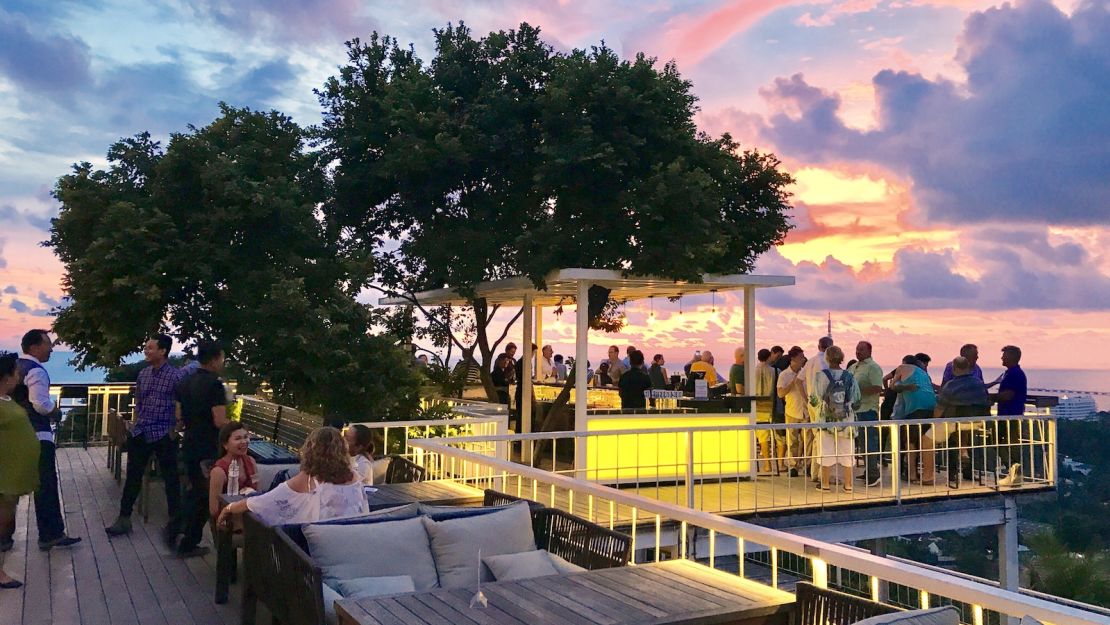
Phu Quoc’s sunsets are famous across Vietnam – not just for their warm sorbet shades, but for their variety.
“Sunsets are amazing on our island. Some days it’s violet, some days it’s orange, some days it’s yellow – even if you stay for a month, you will never grow tired of it,” says Nguyen. “It’s different every day and always very dramatic.”
For a hassle-free way to experience the sunset, Nguyen suggests Long Beach, where the brazen backdrop comes with a side of live music and chilled beers.
But if you don’t mind a little extra effort, Nguyen recommends you take to the hills for a different perspective.
At Chuon Chuon Bistro & Sky Bar – the highest restaurant on the island – you will find refreshing sundowners as well as sweeping views of the jungle, ocean and sky.
Go squid fishing
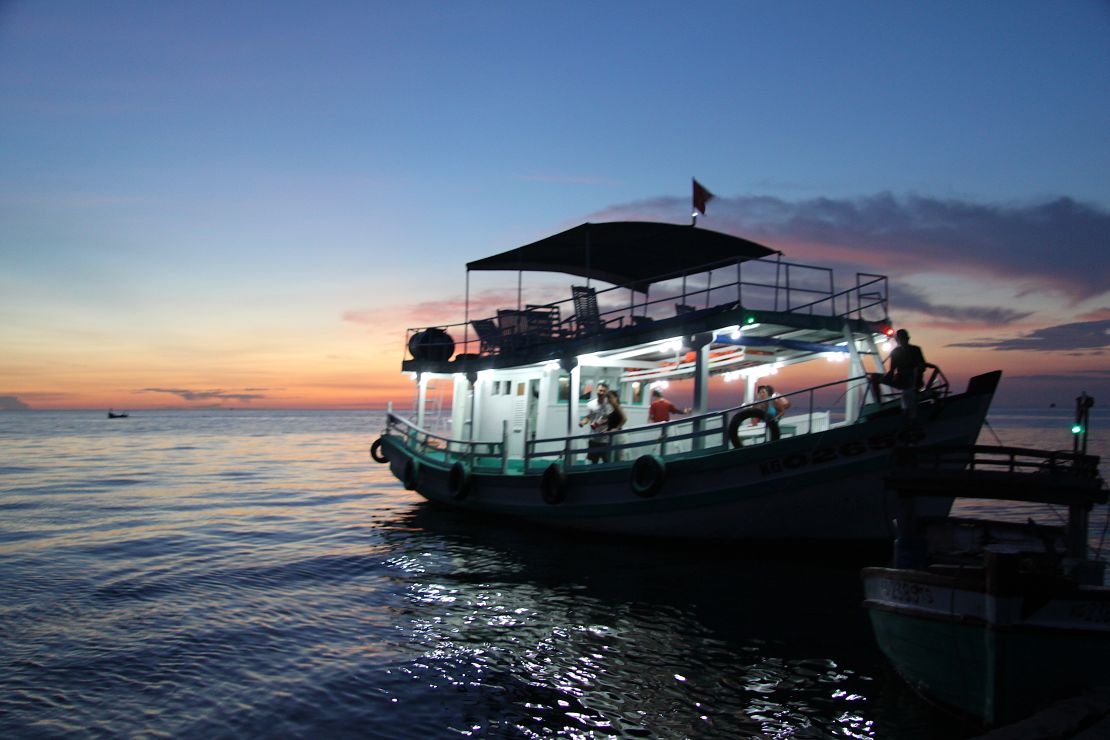
And after the sun goes down? Squid fishing is an unforgettable way to spend a night out.
Tours leave from various points on the island but they all share a similar itinerary: After the boat chugs away from shore for about 30 minutes, the fishermen stop the engine and turn on a bright light, which hangs out over the water, to attract squid.
This process, called jigging, lures the squid so they can capture it with a net.
When the squid swims in the sea it looks like it’s glowing in the water due to their natural bioluminescence.
After the fishermen catch a few squids, they’ll cook up a BBQ dinner right on the boat under the stars.
For an upscale version of the typical local tours, John’s Tours provides a sunset cruise with drinks followed by squid fishing and dinner.
Head to the night market
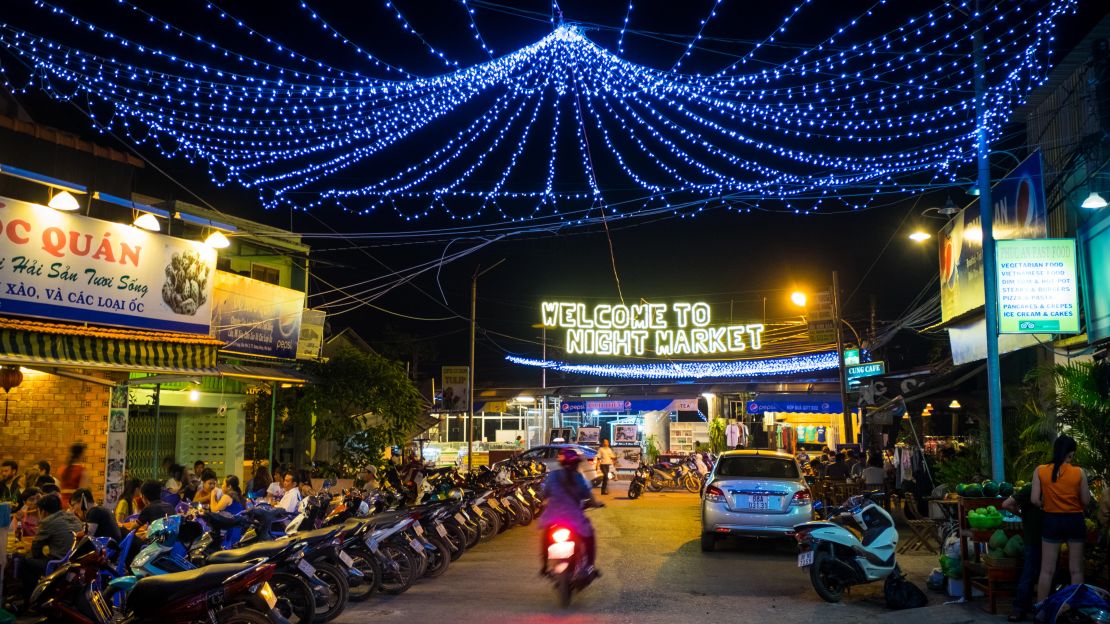
The one and only Dinh Cau Night Market, in the west coast town of Duong Dong (Phu Quoc’s largest urban center), is an experience not to be missed.
A stomping ground for food obsessives, there are dozens of food stalls, aromatic grills and outdoor tables, as well as excellent gourmet souvenirs – think black pepper, coffee, tea leaves, peanuts, chocolate and more.
“Overall the feeling is very much like other night markets in Southeast Asia, but here it’s special because everything is really local,” Nguyen.
“The vendors always invite foreigners to try little bites of food as they walk around, so you should definitely bring an appetite.”
A series of little bars along the river provide a resting place to enjoy a chilled beer or coconut ice cream after your market feast.
Ride the cable car
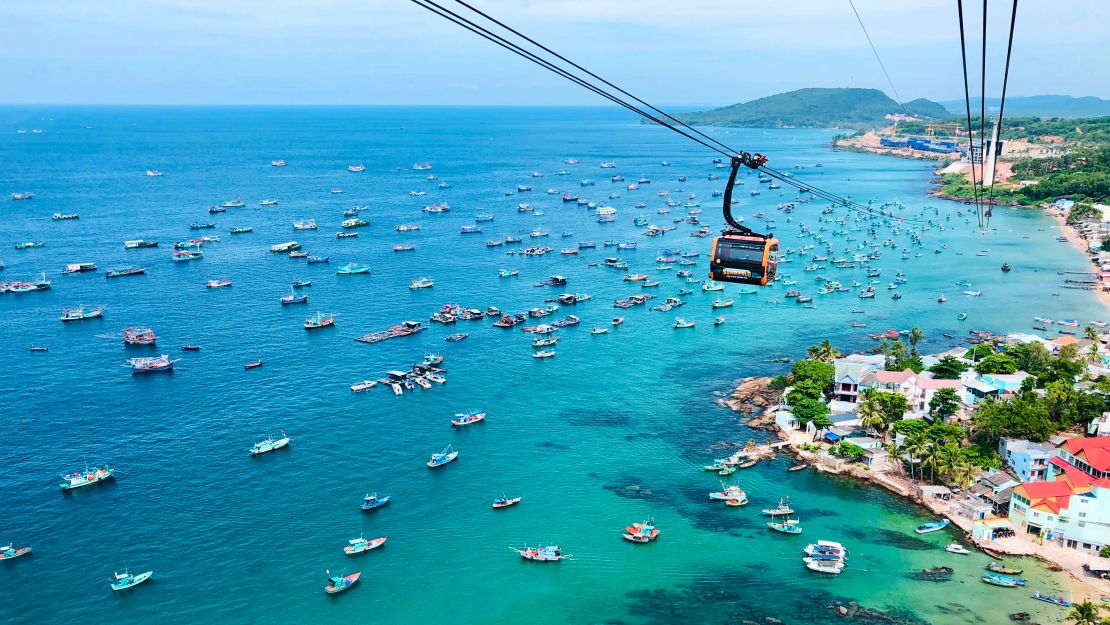
Sure, it might be a little touristy, but it’s hard to argue with the stellar views aboard the Phu Quoc Cable Car.
Just opened last year, this is the longest non-stop three-rope cable car in the world, stretching roughly 5 miles in length.
The ride begins on Phu Quoc island at a quirky Roman-theme station, then soars above the islands and coral reefs below.
After about 15 minutes, you can hop off at Hon Thom island (aka “Pineapple Island”), south of Phu Quoc, to explore the lush Hon Thom Nature Park and lounge at the beach.













